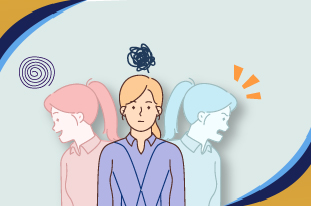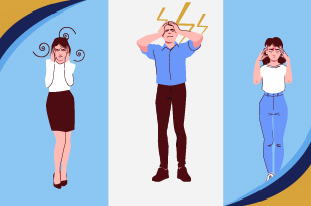Psychosis in elderly people is a severe mental health condition that can occur as hallucinations, delusions, and sometimes even severe confusion. It is usually rooted in underlying issues such as dementia, depression, or the other side effects of psychiatric medications. Additionally, early detection and accurate mental health treatment are essential in improving the quality of life of the suffering people. Comprehensive psychiatric care, such as mental health treatment and supportive therapy, reduces the signs of psychosis.
This blog is a perfect source of information to understand the signs, causes, and treatment of psychosis in elderly people.
What Is Psychosis?
Psychosis is a mental health illness that severely affects the perception of the affected individuals. When it occurs, it is known as a psychotic episode. Additionally, it can have a negative effect on your cognitive potential.
What Are The Signs Of Psychosis In Elderly People?
The most common signs of psychosis include:
- Hallucinations
- Delusions
- Distorted Thinking
- Social Withdrawl
- Changes in sleeping patterns
- Low Motivation
- Extreme Anxiety
- Unusual behavior
Read More: Trauma Brain Vs Normal Brain: How Trauma Affects The Way We Live
What Is The Prevalence Of Psychosis In Elderly People?
Psychosis in elderly people is quite common and different. Several recent researches have estimated that about 10 percent to 25 percent of elderly people will exhibit psychotic symptoms at some point. Such symptoms are even more widespread among patients with such diseases as dementia. In this case, the proportion makes up 40-60%. Elderly psychosis is not as quickly reported or diagnosed, hence making it difficult to pin down the actual figures of the illness.

What Are The Causes Of Psychosis In Adults?
Several recent researches show that elderly people are at a higher risk of developing signs of psychosis, including the signs of mood disorders, delirium, substance abuse, and several related conditions. There can be a lot of reasons. The most common causes of psychosis in elderly are discussed below.
For many people, a wide array of pre-existing conditions can increase the risk of developing a psychotic disorder. Moreover, medical conditions such as multiple sclerosis, Parkinson’s, or Huntington’s can also be one of the leading reasons for triggering the onset of psychotic symptoms. Not only this, many common health problems like lack of sleep and deficiency of vitamin B12 can also lead to the onset.
There can be another possibility in the development of the signs of psychosis is drug-induced psychosis, which happens due to the interaction of several medicines. In reality, many drugs are linked with psychosis in elderly people—the most common ones are anti-inflammatory drugs, antidepressants, antipsychotics, and antihistamines.
What Is Acute Psychosis In Elderly People?
Acute psychosis distinguishes itself as an urgent emergency requiring medical intervention, as acute psychotic disturbance poses a significant risk to the elderly and their physical and mental health. The condition may be symptomatic of a significant undiagnosed physical condition in the patient’s body. They can also be symptoms or complications of a primary diagnosis and should be promptly diagnosed and treated.
What Are The Postoperative Psychosis Elderly Concerns?
Post-operative delirium is also a widespread complication for aged adults who have just undergone surgery. Additionally, postoperative elderly patients can experience signs of psychosis within the weeks after surgery, usually within hours. If untreated, the experiences can be pretty dangerous for elderly people, leading to both health issues and more risk of being hospitalized.
As there is no medication for treating postoperative psychosis, prevention is essential. Luckily, postoperative delirium can be prevented or even managed to some extent. A few simple steps can help avoid postoperative delirium, such as walking or jogging, staying hydrated and resting, ensuring the availability of hearing aids and glasses, and most importantly, taking necessary steps after the surgery to avoid infection.
What Does Psychosis In Elderly Dementia Patients Look Like?
The most common signs of psychosis in older adults include agitation, hallucinations, slurred speech, mood swings, uncooperative behavior, and many other signs that are similar to dementia and often mistaken for dementia. Furthermore, dementia psychosis elderly patients are at a greater risk of experiencing overlooked delirium. This is why it is always advisable to monitor unusual experiences regularly. Additionally, it can aid physicians in better understanding the changes in behavior and how fast they occur.
Read More: Understanding the Stages of Psychosis
What Are The Best Treatment Options For Psychosis In Elderly People?
Psychosis in elderly people can be treated with various treatment methods. The most commonly used ones are as follows:
Antipsychotic Medications:
These medications are specially made to help reduce the signs of hallucinations and delusions. However, elderly patients require special care and consideration in terms of psychiatric drugs as they are sensitive and can experience adverse reactions.
Psychotherapy:
Cognitive behavioral therapy (CBT) is most effective in helping people understand and manage their negative thinking patterns and associated particular behaviors. Additionally, the primary focus of such a therapy is to help the patients change their negative thought patterns into positive ones.
Addressing Underlying Conditions:
It is common in elderly patients to suffer from many underlying mental health conditions such as dementia, depression, or other medical issues. Additionally, treating these conditions is vital to prevent worsening of psychotic signs. A comprehensive approach is adopted to address all the contributing factors.
Non-Pharmacological Approaches:
Providing patients with a calm and supportive environment holds a special place in overall mental health treatment. Moreover, a positive environment can reduce the signs of psychosis by lowering confusion and stress. Family involvement is another important factor in effective mental health treatment. It can provide the patient with emotional support, ultimately making them better.
Regular Monitoring:
Psychosis in elderly people requires continuous monitoring to make the required changes in treatment. Furthermore, regular assessments help mental health providers ensure that the treatment plan is working and safe for the patient.
Concluding Thoughts!
Symptoms of psychosis in elderly people are well-defined as a severe mental disorder that can be associated with conditions such as dementia, depression, or the effects of medication. Some of these manifestations are hallucinations, delusions, and extreme confusion. With the proper stabilization and thorough psychiatric care using antipsychotics, psychotherapy, as well as treatment for general diseases, the signs can be controlled. More importantly, Social support and follow-up are the other factors that enhance the quality of life of elderly patients with psychosis.
























